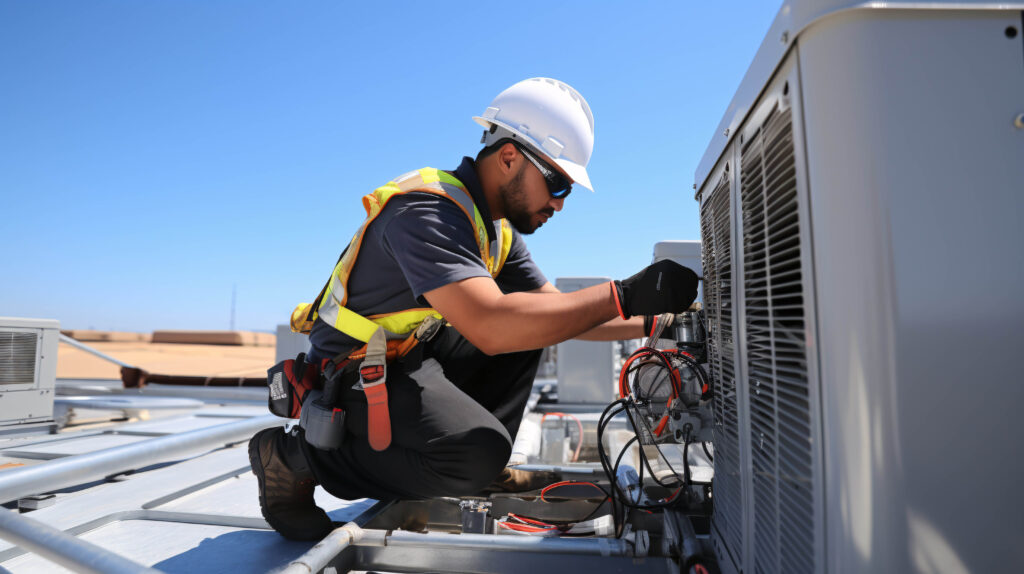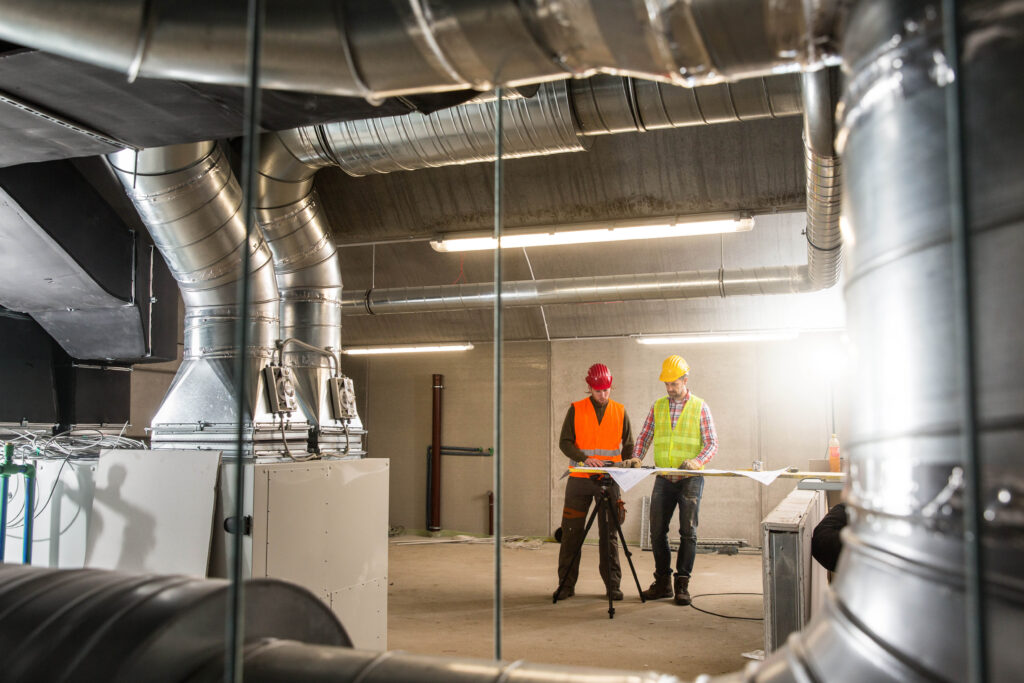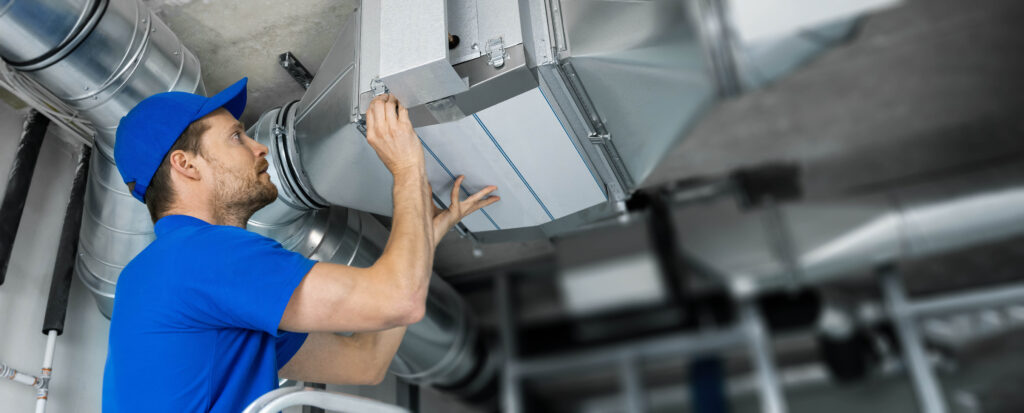- Commercial and Industrial Services
- Commercial and Industrial Service Milestones
- Included Commercial and Industrial Services
- Frequently Asked Questions
- Get a Quote
Commercial and Industrial Services
HVAC commercial and industrial services cater to the unique needs of non-residential properties, including offices, retail spaces, manufacturing facilities, and healthcare facilities. These services encompass designing, installing, maintaining, and repairing HVAC systems tailored to large-scale environments. HVAC professionals develop customized solutions based on space utilization, occupancy patterns, and regulatory compliance.

Installation of commercial and industrial HVAC systems requires careful planning and execution to ensure minimal disruption to operations. Skilled technicians use state-of-the-art equipment to install HVAC systems according to precise specifications. Ongoing maintenance and repair services keep systems operating at peak performance, preventing costly breakdowns and maximizing energy efficiency.
Commercial and industrial HVAC services provide comfortable, safe, and productive environments for businesses, allowing them to focus on their core activities while ensuring optimal heating, cooling, and ventilation.
Commercial and Industrial Service Milestones
Commercial and industrial HVAC services are essential for maintaining optimal indoor environments in non-residential properties. These services begin with a thorough assessment to understand specific needs, followed by custom system design and precise installation to ensure seamless integration. Regular maintenance and prompt repairs keep systems running efficiently, while periodic upgrades and energy audits help enhance performance and reduce costs. This comprehensive approach ensures reliable and cost-effective HVAC solutions for commercial and industrial settings.

Commercial and industrial HVAC services have several key milestones:
- Initial Assessment: HVAC professionals begin with a thorough evaluation of the client’s specific needs, considering operational requirements and budget.
- System Design and Planning: Customized solutions are developed, including zone control, energy recovery ventilation, variable refrigerant flow, and building automation.
- Installation: This phase involves the careful planning and integration of HVAC systems into existing infrastructure with minimal disruption to operations.
- Ongoing Maintenance and Repairs: Scheduled maintenance programs are crucial for preventing breakdowns, extending equipment lifespan, and maintaining energy efficiency.
- System Upgrades and Retrofits: Upgrading outdated systems to improve performance and compliance with current standards.
- Emergency Services: Many providers offer 24/7 emergency services to address urgent HVAC issues promptly.
- Energy Audits and Optimization: Regular audits to ensure systems are operating efficiently and recommending upgrades to maintain efficiency standard.
Included Commercial and Industrial Services
Services in HVAC Commercial and Industrial encompass a range of specialized activities designed to meet the unique demands of non-residential properties. These services include the evaluation, design, installation, maintenance, and upgrading of HVAC systems to ensure optimal performance, efficiency, and reliability. By addressing needs such as space utilization, regulatory compliance, and energy efficiency, these services provide essential support for maintaining environments in commercial and industrial settings.

HVAC Commercial and Industrial Services
- Initial Assessment and Consultation: HVAC professionals evaluate the specific needs and constraints of the facility, considering factors like space utilization, occupancy patterns, and regulatory requirements.
- Custom Design Solutions: Tailoring HVAC systems to meet the unique requirements of each commercial or industrial client, ensuring optimal performance and efficiency.
- Installation: Setting up HVAC units, ductwork, and control systems with precision to ensure seamless integration with existing infrastructure.
- Commissioning and Testing: Verifying that the installed systems function correctly and efficiently through rigorous testing and evaluation.
- Scheduled Maintenance: Implementing regular check-ups and servicing to maintain system performance, prevent breakdowns, and extend equipment lifespan.
- Emergency Repairs: Providing prompt repair services to address unexpected system malfunctions, minimizing downtime and ensuring continuous operation.
- Energy Efficiency Upgrades: Implementing new technologies and systems designed to reduce energy consumption and improve overall efficiency, leading to cost savings and enhanced performance.
What is the typical lifespan of a commercial HVAC system?
- The lifespan of a commercial HVAC system typically ranges from 15 to 20 years with regular maintenance and proper care.
How often should commercial HVAC systems be serviced?
- It is recommended to have maintenance checks at least quarterly, with more frequent visits for high-use systems to ensure optimal performance and longevity.
What are the benefits of upgrading to a high-efficiency HVAC system?
- Upgrading can lead to lower energy bills, improved indoor air quality, enhanced system performance, and reduced environmental impact.
What should be included in a regular HVAC maintenance plan?
- A regular maintenance plan should include filter changes, cleaning of coils, inspection of ductwork, testing of system performance, and replacement of worn-out components.
How do commercial HVAC systems differ from residential ones?
- Commercial HVAC systems are typically larger, more complex, and designed to handle greater demands. They often feature zone control, advanced automation, and are located in utility rooms or on rooftops for easy access and noise reduction.
How can I improve the energy efficiency of my existing commercial HVAC system?
- Regular Maintenance: Schedule routine inspections and servicing.
- Programmable Thermostats: Upgrade to advanced, programmable models.
- Sealing Ductwork: Seal and insulate ducts to prevent leaks.
- Energy-Efficient Retrofits: Consider upgrades like variable speed drives and high-efficiency units.
- Building Automation Systems: Implement automation for optimized energy use.
What are common signs that a commercial HVAC system needs repair?
- Unusual Noises: Grinding, banging, or squealing sounds.
- Inconsistent Temperatures: Uneven heating or cooling across the facility.
- Reduced Airflow: Weak airflow from vents.
- Higher Energy Bills: Unexpected increases in energy costs.
- Frequent Cycling: The system frequently turning on and off.
- Odors: Unpleasant smells indicating potential issues.
Request Your Personalized Commercial and Industrial HVAC Quote
Ensure your commercial and industrial HVAC systems are operating at peak efficiency—contact us today for a personalized quote and experience unmatched service and reliability!
